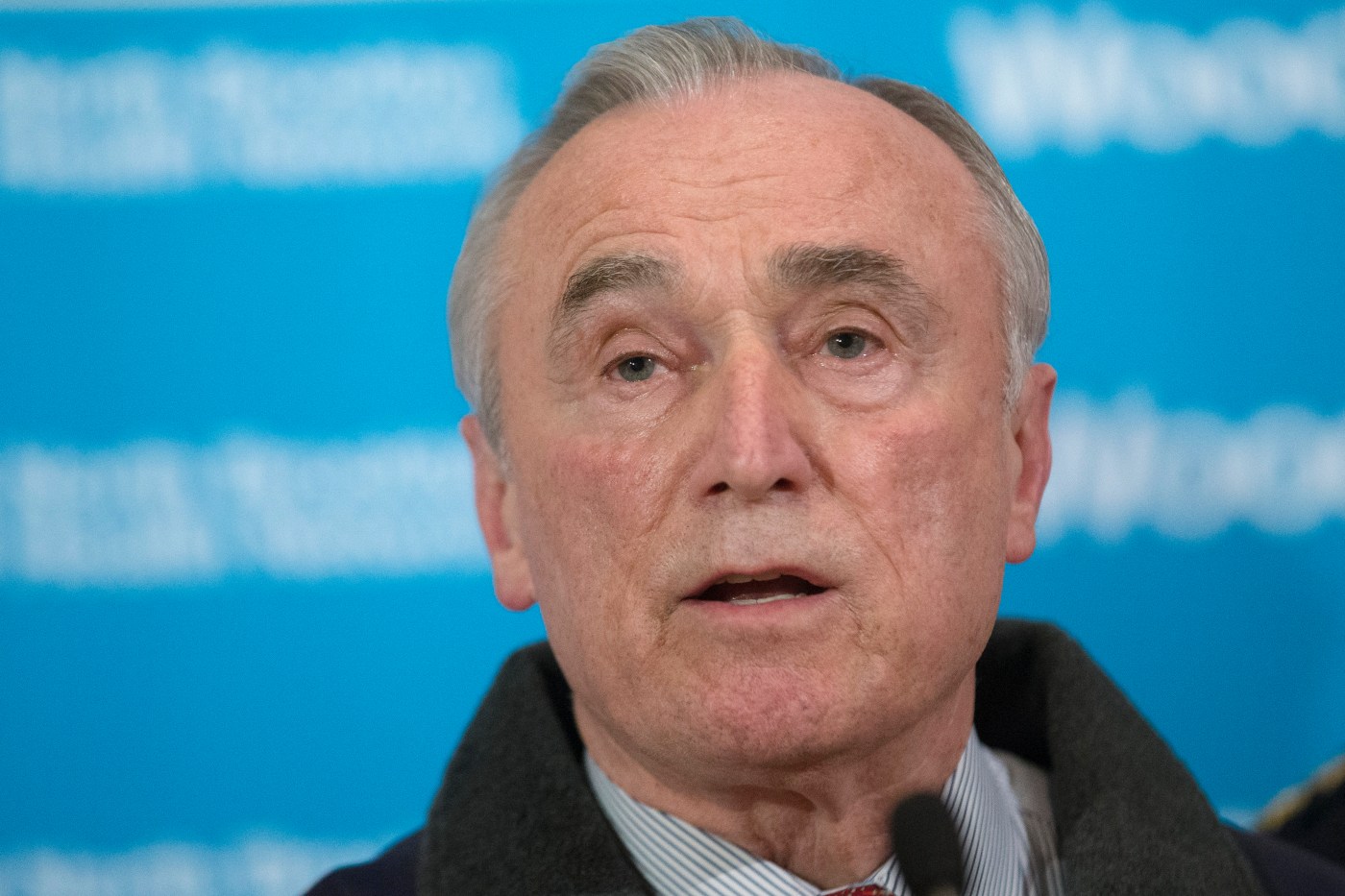
Ex-Boston, New York police chief Bill Bratton: ‘It’s very hard to rig a whole national election’
Bill Bratton, who has led the Boston, New York City and Los Angeles Police Departments, says he believes this election is “going to be unlike any we’ve certainly seen in modern times” given the tension sweeping the nation.
That’s what he said in an interview with the Herald on Friday while attending the four-day International Association of Chiefs of Police annual conference at the Boston Convention and Exhibition Center.
Topics up for discussion at the conference include ways to detect, respond and prevent election security issues, and how law enforcement agencies can collaborate “to ensure the elections go off in an orderly manner,” Bratton said.
“You’d have to go back sometime in history to get a time when there’s been this much tension,” he said, “and in certain areas of the country, an absolute fear about the election process as well as the amount of disinformation and misinformation that’s being constantly spread about the validity of the election process.”
The conference comes after national and state Republicans in Georgia appealed a judge’s ruling on Thursday that seven election rules recently passed by the State Election Board are “illegal, unconstitutional and void.”
Fulton County Superior Court Judge Thomas Cox ruled Wednesday that the State Election Board did not have the authority to pass the rules and ordered it to immediately inform all state and local election officials that the rules are void and not to be followed.
The rules that Cox invalidated include three that have received a lot of attention — one that requires ballots be hand-counted after the close of polls and two that had to do with the certification of election results.
Concerns around election security in Massachusetts are “certainly less” than they are in the battleground states, Bratton said. He added that voting results won’t be known “for days” in certain states where plans are already in place to appeal the outcome no matter what.
Early voting started on Saturday in the Bay State.
Officials are keeping close tabs on social media to see if there are any threats against voting places and officials and candidates, Bratton said, highlighting apparent assassination attempts targeting Donald Trump.
“People will think the election was rigged,” Bratton said, “part of that is being generated by the misinformation and disinformation being spread by a number of the candidates.
“It’s unfortunate because everything I understand and believe is that the voting processes in this country are very, very fair,” he added. “And it’s very hard to rig a whole national election.”
Distrust
In past months, Secretary of State William Galvin has expressed concern about the growing level of distrust in the nation’s electoral process, a worry he said he shares with election officials from other states.
In a June interview with WBZ, Galvin said he and other state election officials have shared concerns over emerging technology — like deepfakes and AI — and over the increasing number of voters and politicians questioning the legitimacy of elections.
Even if voters have no reason to cast doubt on the system, Galvin said, it doesn’t make their doubts any less real, and “it’s contributing to an unease in our democracy.”
“We have to get beyond that,” Galvin said.
In August, Massachusetts’ top election overseer warned residents against responding to or engaging with text messages that told them they were not eligible to cast a ballot after local officials reported multiple instances of the communications to his office.
Weeks later, in September, the FBI notified Galvin’s office that postal service investigators had identified a suspicious envelope delivered to a building housing state offices which was intercepted. Election officials in more than 15 other states also were either sent or received similar packages.
The National Association of Secretaries of State condemned what it described as a “disturbing trend” of threats to election workers leading up to Nov. 5.
“This must stop, period,” the group said. “Our democracy has no place for political violence, threats or intimidation of any kind.”
Bratton
Bratton began his policing career in Boston, in the 1970s, and he recounted how he worked at polling places across the city, keeping order and ensuring election rules were being obeyed.
At the end of the day, he’d take the ballots and bring them to City Hall, he remembered. Those times, though, are long gone.
“Now we have electronic voting, early voting. It’s a very different situation,” Bratton said. “And we also have a lot more suspicion unfortunately about election results and the way elections are conducted.”
“We are living in very interesting times.”
The Associated Press contributed to this report


